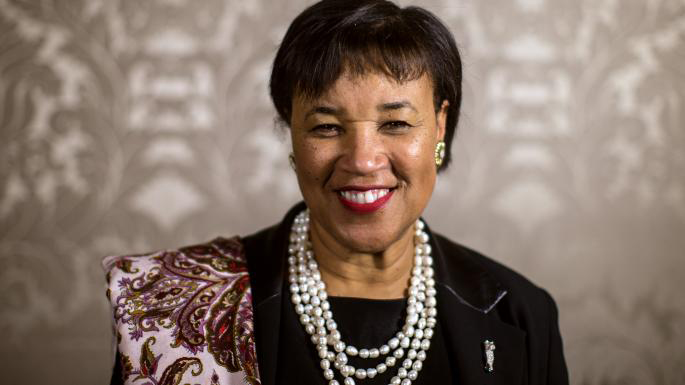An 11-member Common-wealth delegation is due to arrive in Guyana today to begin an observation mission for the March 2nd general and regional elections.
The observer group, chaired by Owen Arthur, former Prime Minister of Barbados, will consider all aspects of the elections process and determine whether the elections are conducted to the democratic standards to which Guyana has committed itself. It will also offer recommendations on how electoral stakeholders can further strengthen democratic processes.
“Election observation is a core Commonwealth role undertaken with impartiality, independence and transparency,” a statement from the Commonwealth Secretariat explained.
Speaking with Stabroek News on Friday, Commonwealth Secretary-General Baroness Patricia Scotland explained that the observer mission as well as the expert support that has been provided to the Guyana Elections Commission (GECOM) is a demonstration of the Commonwealth’s commitment to support all its elections management bodies to ensure they are as resilient and as well-resourced as possible.
She noted that the Secretariat was pleased at the request of the Ministry of Foreign Affairs to provide an observer mission, which will be adequately supported by a staff support team that was present for the disciplined services voting last Friday.
Baroness Scotland indicated that the observer group will issue a statement upon its arrival and also conduct a series of interviews and in time a final report on the entire process.
She stressed that the Commonwealth Secretariat has always been supportive of GECOM and noted that based on reports the two electoral experts provided to it have been very useful and well received by everyone.
These experts, former Chief Election Commis-sioner of India Dr. Syed Nasim Ahmad Zaidi and former Chairman of the Ghana Electoral Commission Kwadwo Afari-Gyan, have been in Guyana since late January. Their particular function according to GECOM Chair retired Justice Claudette Singh, is to both observe the commission’s processes and act as advisors to her office.
Last September, Baroness Scotland issued a statement calling on President David Granger “to restore constitutional rule in Guyana by immediately setting an early election date in consonance with its constitution, enabling elections to be held without further delay.”
The statement was issued three months after the June 18th, 2019 ruling of the Caribbean Court of Justice, which upheld the validuity of a December 21st,2018 no-confidence vote against the government.
It stressed that the CCJ’s ruling was clear that the Guyana Constitution sets out certain requirements for the time of an election after the valid passing of a no-confidence motion and reminded that the rule of law and constitutional governance are fundamental Common-wealth values to which Guyana has subscribed.
“In this regard, and in accordance with the ruling of the CCJ, a general election in Guyana is now constitutionally overdue. A general election should be held in accordance with the unambiguous constitutional imperative to do so,” it concluded.
Six days later, President David Granger named March 2nd, 2020, as the date for elections.
Asked why she felt compelled to issue the statement and if she was satisfied with the response, Baroness Scotland said that the response from all parties showed Guyana as a vibrant democracy.
“We need to celebrate that Guyana has always complied with the rule of law. When there were difficulties and disagreements and challenges, the parties in Guyana, quite properly, took their concerns to the court, which adjuducated and made a decision. Those decisions were then acted upon and I think that demonstrated that there is a vibrant democracy because the method by which both parties chose to resolve their difficulties was by taking advantage, going to the court and letting the court decide what the right course must be. That was reassuring,” she said.
In addition to Arthur, the observer mission’s membership also comprises Lebrechtta Nana Oye Bayne, a Social Economist and Gender Expert from Antigua and Barbuda; Sir Gerald A. Watt, Speaker of the House of Representatives, Antigua and Barbuda; Lisa Shoman, the Former Foreign Minister, Tribunal Judge and Senior Counsel of Belize; Josephine Tamai, Chief Elections Officer of Belize; John Hendra, former United Nations Assistant Secretary-General from Canada; Gitobu Imathiu Imanyara, former MP of Kenya; Mitra Vasisht a retired Ambassador of India; Sarah Fradgley, a Media Expert from New Zealand; Dr Paikiasothy Saravanamuttu, Executive Director, Centre for Policy Alternatives, Sri Lanka; and Stephen John Hiscock, a Retired Diplomat from the United Kingdom, who had served as former British High Commissioner to Guyana.






